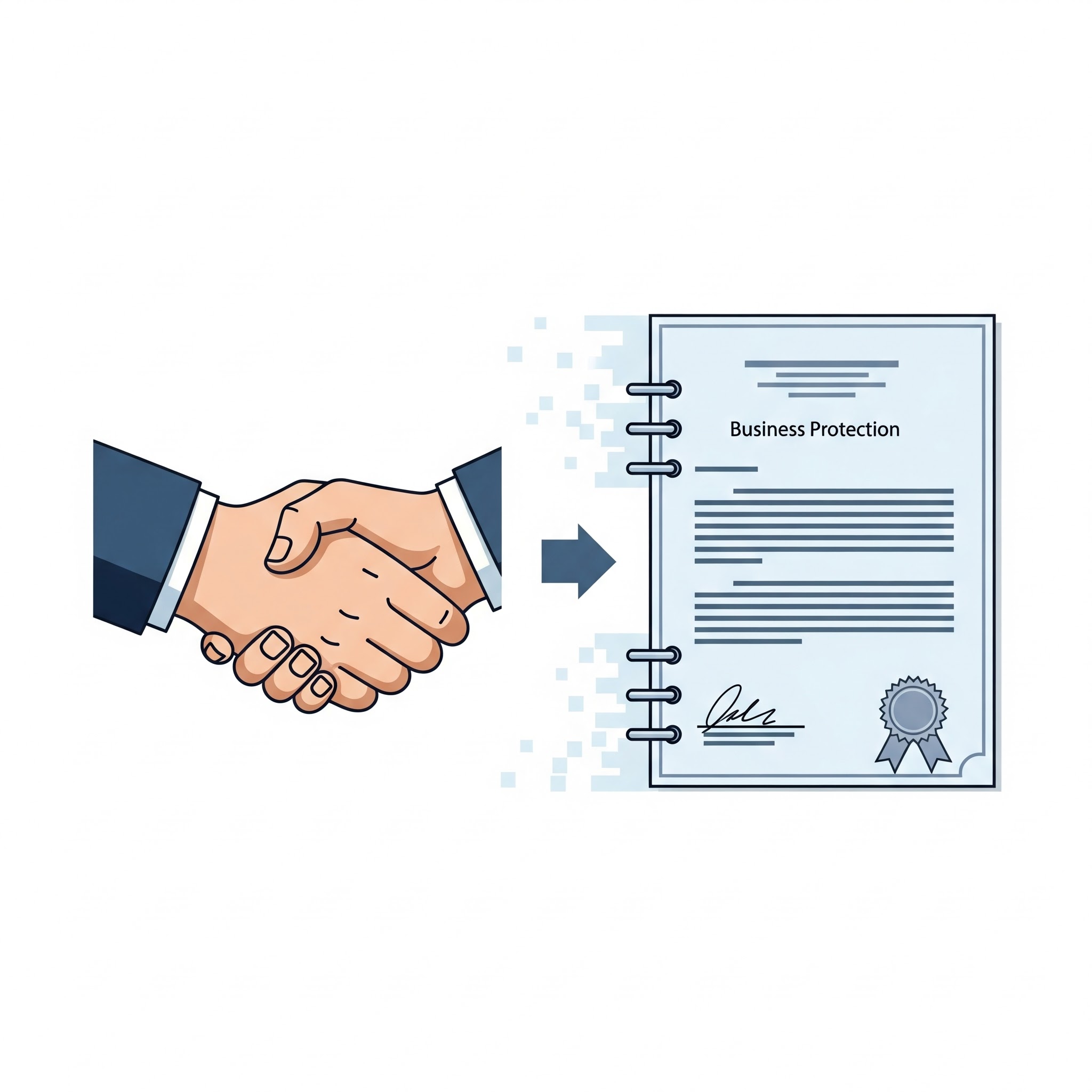From Handshake to Headache: Why Solid Contracts Are Your Business's Best Friend

Have you ever sealed a business deal with just a handshake and a smile? It feels good, doesn't it? That moment of mutual trust, the excitement of a new partnership, the promise of opportunity ahead. But what happens when memories fade, circumstances change, or expectations differ? That warm handshake can quickly turn into a throbbing headache.
As a small business owner, you're building relationships every day, with clients, vendors, employees, and partners. While trust is the foundation of these relationships, proper contracts are the framework that keeps them standing strong through storms and sunshine alike. Trust me, I've added a few clauses into my existing contracts based on how reality transpired.
Today, we're going to explore why solid contracts aren't just legal formalities but essential tools that protect your business, clarify expectations, and actually strengthen your professional relationships. Whether you've been burned before or you're just starting out, this guide will help you understand the critical role contracts play in your business success.
Why "We'll Figure It Out Later" Rarely Works Out
Many entrepreneurs, especially those just starting out, shy away from formal contracts. The reasons are understandable:
- "We trust each other – we don't need all that legal stuff."
- "Contracts feel too formal and might scare away potential clients."
- "I don't have the time or money to deal with proper agreements."
- "It's a simple job – what could possibly go wrong?"
Sound familiar? Unfortunately, this approach often leads to misunderstandings, scope creep, payment disputes, and damaged relationships. The truth is that memories fade, and even the most well-intentioned people can have different recollections of what was agreed upon.
Consider this scenario: You're a graphic designer who agreed to create a logo for a client. In your mind, the agreement included three revision rounds. In their mind, they get unlimited revisions until they're completely satisfied. Without a contract specifying the terms, who's right? And more importantly, how do you resolve this without damaging the relationship?
The Building Blocks of Business Protection
A solid contract doesn't have to be filled with intimidating legal jargon. At its core, it's simply a clear document that spells out what everyone is agreeing to. I'm not a lawyer and you should have your personal attorney familiar with your business review your contracts. But here are the essential elements every small business contract should include:
1. Clear Identification of All Parties
This seems obvious, but be specific. Include full legal names, business names, addresses, and contact information. For businesses, clarify whether you're contracting with the individual or the company.
2. Detailed Scope of Work
This is where misunderstandings most commonly occur. Be extremely specific about:
- Exactly what products or services you're providing
- What is NOT included
- Deliverables and their specifications
- Timeline and milestones
- Revision processes and limitations
3. Payment Terms
Don't leave money matters to chance. Specify:
- Exact pricing and what it covers
- Payment schedule and acceptable methods
- Deposits or retainers required
- Late payment penalties or incentives for early payment
- Additional costs that might arise and how they'll be handled
4. Timeline and Deadlines
Include specific dates for:
- Project start and completion
- Milestone deadlines
- Review periods
- When payments are due
5. Responsibilities of Each Party
Clearly outline what you'll provide and what you need from the other party to fulfill your obligations. This might include:
- Materials or information they need to provide
- Approval processes and response timeframes
- Access requirements
6. Termination Clauses
Even with the best intentions, sometimes relationships need to end. Include terms for:
- How either party can terminate the agreement
- Notice periods required
- Payment for work completed
- Ownership of work in progress
7. Dispute Resolution Process
Specify how disagreements will be handled before they escalate:
- Communication requirements
- Mediation processes
- Jurisdiction for legal matters if necessary
Contracts as Relationship Builders
Here's a perspective shift: rather than viewing contracts as signs of distrust, see them as tools for building stronger, clearer relationships. A good contract actually demonstrates professionalism and care for the business relationship.
When you take the time to create a thorough contract, you're essentially saying: "This relationship matters to me. I want to make sure we're both protected and on the same page."
The process of creating and reviewing a contract often reveals potential issues before they become problems. It forces both parties to think through details and expectations, leading to fewer surprises down the road.
Remember that client who wanted unlimited logo revisions? Imagine instead that your contract had clearly stated "package includes initial concept plus three revision rounds; additional revisions billed at $X per round." The client knows exactly what to expect, you're protected from scope creep, and the relationship remains positive because expectations were clear from the start.
Contracts don't replace trust – they enhance it by providing clarity and security for all involved. They transform potentially contentious situations into straightforward business processes.
Remember, in business, the strongest relationships aren't built on handshakes alone – they're built on clarity, communication, and mutual protection. Your contracts aren't just paperwork; they're peace of mind.